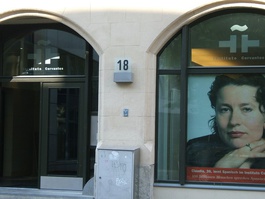
Cervantes: torchbearer of Spanish culture abroad
Published on
Translation by:
 Darren Thompson
Darren Thompson
The main function of this institution, created as recently as 1990, is to spread Spanish culture abroad, thanks to the diffusion of its language and its 'hispanidad'. The success of the Cervantes network may well inspire other great cultural nations in Europe to follow suit
A big thank you to Jorge Semprún. The 'Instituto Cervantes' or Cervantes institute network is often considered the brainchild of this writer and Spanish politician, created when he was culture minister in Felipe González' socialist government. The institutes are closely tied to the Spanish ministry for culture which is the reason behind the extension of politics outside of Spain.
The institutes are closely tied to the Spanish ministry for culture; the reason behind the extension of politics outside of Spain
The current culture minister of Jose Luis Rodriguez Zapatero´s government, César Antonio Molina, had been director of the Cervantes institute network until 2007. The community comprises 400 million Spanish speakers, with 70 outposts in 40 countries worldwide. Spain itself is a multicultural nation in which various other languages are spoken; Catalan, Galician and Basque, all co-official languages in Spain, are promoted and taught in Cervantes centres worldwide.
Brazil, Ireland and Frankfurt
 Whereas the British and French institutes have streamlined their networks by closing various sites worldwide, the Cervantes institute has reinforced its presence, by opening five new locations in 2008 alone. In Europe the Frankfurt institute opened its doors in October 2008, joining Berlin, Munich, Bremen and Hamburg to become the fifth German location. 2008 also saw the opening of the until 2007 institute managed by 39 year old poet Julia Piera. Brazil retains its record as the country with the greatest Cervantes presence, following openings in Recife, Florianapolis and Belo Horizonte, taking the total to nine.
Whereas the British and French institutes have streamlined their networks by closing various sites worldwide, the Cervantes institute has reinforced its presence, by opening five new locations in 2008 alone. In Europe the Frankfurt institute opened its doors in October 2008, joining Berlin, Munich, Bremen and Hamburg to become the fifth German location. 2008 also saw the opening of the until 2007 institute managed by 39 year old poet Julia Piera. Brazil retains its record as the country with the greatest Cervantes presence, following openings in Recife, Florianapolis and Belo Horizonte, taking the total to nine.
Television on the web
One of the characteristics of the network is web broadcasting, allowing for online, tailor made language learning. AVE or Aula Virtual de Español ('virtual Spanish classroom') allows users to follow courses online. This feature is unique to Cervantes as other European cultural networks do not offer this service, classes being offered on a face-to-face basis. However, the innovation doesn’t stop there as the Cervantes institute launched their television on the web service in 2008. Through the system, Cervantes offers further educations material to students and teachers. More anecdotal, but following the theme of innovation, since 2007 its presence can also be felt in the virtual world, Second Life.
The strategy: language
 Unlike the British council or 'les alliances françaises', Cervantes has one main mission; the promotion of language. This has been the key to its success, a clear strategy which has saved it the various dilemmas which the British and French counterparts have had to face. The British council, in choosing to promote culture, risks being considered as promoting globalisation or a particular political vision by attempting to link culture to international diplomacy. This dilemma has led the British council to choose transversal themes like intercultural dialogues and protection of the environment.
Unlike the British council or 'les alliances françaises', Cervantes has one main mission; the promotion of language. This has been the key to its success, a clear strategy which has saved it the various dilemmas which the British and French counterparts have had to face. The British council, in choosing to promote culture, risks being considered as promoting globalisation or a particular political vision by attempting to link culture to international diplomacy. This dilemma has led the British council to choose transversal themes like intercultural dialogues and protection of the environment.
In regards to the French network, it still plays an important role in French speaking countries, by generating policies of coexistence and cooperation. Cervantes is not present in as many Spanish speaking countries, as smaller cultural centres in the embassy take their place. This allows Spain to concentrate its efforts on a more focussed list of around sixty non-Spanish speaking countries whereas other European cultural networks have to tread more carefully, at the risk of a being criticised for their actions.
Translated from Cervantès : le bel hidalgo de la culture espagnole à l’étranger


